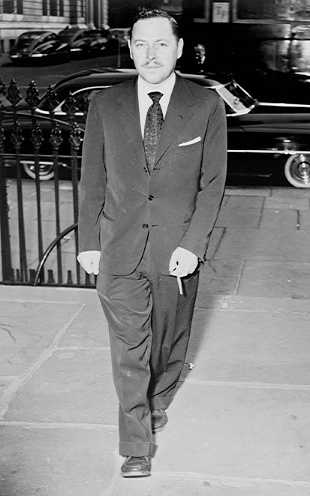Tennessee Williams was born on March 26, 1911, in Columbus, Mississippi. Always a sensitive child, he suffered his first nervous breakdown when he was thirteen. At seventeen, Williams won his first writing prize for an essay "Can a Good Wife Be a Good Sport?"
During the Depression, he dusted shoes for $65 dollars a month. Always the jokester, Williams admitted later, "I went from shoe biz to show biz."
Tennessee Williams wrote twenty-four plays and won two Pulitzer Prizes. Some of his most famous and controversial plays include The Glass Menagerie, A Streetcar Named Desire, Cat on a Hot Tin Roof, The Rose Tattoo, Sweet Bird of Youth, and Summer and Smoke. Like another American playwright, Arthur Miller, Williams focused on "left-out" Americans, honoring the struggles and the suffering of those living as outsiders.
With a magic style all his own, this Southern homosexual blended poetry with naturalism and almost single-handedly opened up the American theatre to dark subject matter — incest, cannibalism, drug addiction, madness, sexual addiction, and other topics usually not explored publicly. In a very real sense, he helped introduce us to our collective shadow.
To Name This Day . . .
 Films
Films
Read one of Tennessee Williams plays or watch one of the many film adaptations of them. Here are reviews of two good films:
 Spiritual Practice
Spiritual Practice
Unitarian Universalist minister Phillip Lund has created a series of small group program guides based on the Alphabet of Spiritual Literacy. Using his program on shadow, either by yourself or with a small group is a good way to remember Tennessee Williams' contributions to the literature of shadow. The full program is here. Here is a quote from it with suggestions for reflection.
"Psychologist James Hillman can always be counted on to come up with a fresh image to make his points. In this excerpt from The Force of Character and the Lasting Life, he encourages us to deal with the shadow parts of ourselves:
"I like to imagine a person's psyche to be like a boardinghouse full of characters. The ones who show up regularly and who habitually follow the house rules may not have met other long-term residents who stay behind closed doors, or who only appear at night. An adequate theory of character must make room for character actors, for the stuntmen and animal handlers, for all the figures who play bit parts and produce unexpected acts. They often make the show fateful, or tragic, or farcically absurd."
- Who are some of the characters in your psyche's boardinghouse?
- Are there any oddball ones you would like to introduce to the regulars?
